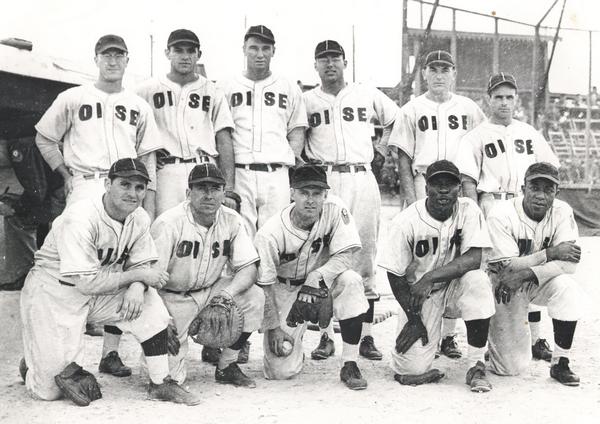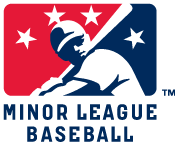

Would you like to sponsor this page? Contact gary@baseballinwartime.com
 Leon Day
Leon Day
Date and
Place of Birth:
October 30, 1916
Baseball Experience:
Negro League and Minor LeaguePosition: Pitcher
Rank: Unknown
Military Unit: 818th Amphibian Battalion US Army
Area Served:
European Theater of Operations
 Leon Day was born on October 30, 1916 in
Leon Day was born on October 30, 1916 in After two years at
The Eagles relocated to
The 1942 East-West all-star game played in
In 1943, Day was 4-5 and
batted .304 for the second from last-placed Eagles. It was his last
season in professional baseball for three years. The Army drafted
26-year-old Day on September 1, 1943. He served with the
818th
Amphibian Battalion in Europe and was at
When the war in
The All-Stars – on paper a mismatch of minor
league, Negro league and semi-pro players – breezed through the
opposition and reached the ETO World Series championship finals
where they faced the formidable 71st Infantry Division
representing the Third Army. The 71st Infantry line-up
featured Ewell Blackwell,
Harry Walker,
Johnny Wyrostek and
Maurice
Van Robays.
Before a crowd of 50,000 at Nuremberg Stadium in
But Game Two, with Leon Day on the mound was a
different story. Day allowed just four hits and struck out ten to
lead the All-Stars to a 2-1 victory and even the series at one game
apiece.
The All-Stars clinched Game Three by a score of 2
to 1 with Sam Nahem on the mound and Day came back to pitch Game
Four. This time, however, he was not as successful, beaten by the 71st,
5-0.
Nevertheless, the All-Stars clinched the series
in the final game on September 8. Sam Nahem and Bob Keane combined
for the 2-1 win.
 |
| OISE All-Stars - ETO Champions 1945 (Leon Day is front row, far right) |
The Oise All-Stars, together with some of the players from the Third Army team, traveled to Italy the next month to play for the Mediterranean Theater championship. Day beat an all-black team to clinch the championship. He then hurled for the black team and beat Ewell Blackwell and the OIOSE team, 8-0, in Nice, France.
Day was discharged in February 1946 and returned
in style to the Newark Eagles in May. He hurled an opening day 2-0
no-hitter against the Philadelphia Stars. Day faced only 29 hitters
and struck out six. “Day dazzled the Stars with his speedball,”
wrote the Baltimore Afro-American on May 11, 1946, “allowing only
three to reach first base, one on a walk and two on errors by
teammates.”
He finished the season with a 14-4 record, and
led the league in strikeouts, innings pitched, and shutouts, as the
Eagles cruised to the Negro National League title. Unfortunately,
Day came up with a sore arm towards the end of the season. With the
Polo Grounds full of major league scouts, the 30-year-old was
ineffective in his only World Series appearance against the Kansas
City Monarchs.
In 1947, the year Jackie Robinson broke the color
line in Major League baseball, Day played for the Mexico City Red
Devils of the Mexican League. He was 10-11 on the mound and batted
.359. He was back with the Red Devils in 1948 and posted an 8-9
record and 4.34 ERA. He continued to play in the Mexican League in
1948 but returned to the Negro National League in 1949 to help the
Baltimore Elite Giants win the pennant.
Day went to
Day returned to
"People don't know what a great pitcher Leon Day
was,” says Monte Irvin. “He was as good or better than Bob Gibson.
He was a better fielder, a better hitter, could run like a deer.
When he pitched against Satchel, Satchel didn't have an edge. You
thought Don Newcombe could pitch. You should have seen Day! One of
the best complete athletes I've ever seen."
On March 7, 1995, the Veteran's Committee elected
Leon Day to the Baseball Hall of Fame. He was the 12th Negro League
star elected. Leon Day had been admitted to St Agnes Hospital in
Baltimore with a heart condition a few days earlier and died on
March 14, aged 78.
“It is rare that you find an individual with
talent, ambition and humility,” declared the Honorable Kweisi Mfume
in the House of
Representatives on March 15, 1995. “But those are just some
of the defining and wonderful qualities of Leon Day, one of
In 2001, Day’s widow, Geraldine Day, founded the Leon Day Foundation
in 
Created January27, 2008. Updated May 10, 2015
Copyright © 2015 Gary Bedingfield (Baseball in Wartime). All Rights Reserved.